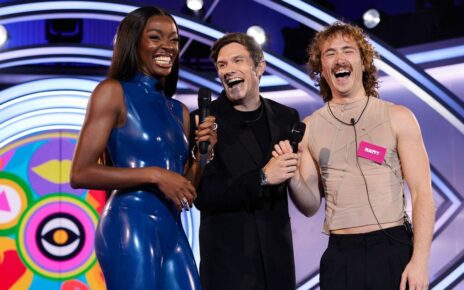It’s the stock answer that many a happy long-term couple has given prying friends and relatives to explain why they haven’t married: “We don’t need a piece of paper to prove our love.” True enough. What can official documents tell you of something as wily and elusive as human desire? Is a band of gold a safeguard against a change of heart? Of course not, yet millions want it anyway, a ratification of feelings that might otherwise seem slippery or intangible from the outside. In the alternate universe of “Fingernails,” a quietly searching and yearning science-fiction romance from Greek director Christos Nikou, the piece of paper in question isn’t a marriage certificate but a printed test result: a mathematical, machine-determined declaration that you and your partner are fully in love.
Sounds ludicrous, sure. But with a sly wit that doesn’t preclude its honest emotional intelligence, “Fingernails” invites us to consider whether such a concept is any sillier than the validating systems and symbols we devise — from marital contracts to algorithmic dating apps — to fix our relationships in place, or to make finite our search for another half. The longer its ideas gnaw at us, the less alternate its universe seems: Set either in a cozily low-tech future or a recent parallel past, where phones are still corded and car windows are manually wound, the disarming world-as-we-nearly-know-it air of Nikou’s fantasy is amplified by two performances of acutely familiar humanity by Jessie Buckley and Riz Ahmed, ideally matched as love-laboratory technicians whose growing mutual attraction defies the science.
The setting is not quite any time or place, though Toronto locations are skillfully chosen to evoke a homogenized but not yet dehumanized urban landscape. The season, however, is both clear and consistent: “Fingernails” unfolds in a kind of perennial autumn, captured by cinematographer Marcell Rév in soft, flannelly shades of fawn and russet, familiar from many a comfort-watch romcom. That hardly seems accidental in a story world where any number of environmental details are specifically selected for their romantic associations: At the Love Institute, the compatibility testing facility where former schoolteacher Anna (Buckley) seeks a job, songs are sung in French because it’s the designated language of love, while the sound of rainfall is piped through the speakers because it’s the most swoonsome weather.
As in Yorgos Lanthimos’s comparably lo-fi sci-fi “The Lobster,” the vision here is of a world where society’s fixation with coupledom has been taken to regimented extremes. If the consequences for single people aren’t as macabrely punitive here as they were in Lanthimos’s film, they’re still passive-aggressively pointed: Restaurants offer discounts to certified lovers, schools drum a happily-ever-after rewrite of the Adam and Eve myth into students, while movie theaters program Hugh Grant marathons on the basis that “nobody understands love more.” Couples aren’t legally obligated to take the test, but social pressure to do so is significant. Anna and her mild-mannered boyfriend Ryan (Jeremy Allen White) have been certified for three years, and their relationship has settled into the kind of dull complacency that, in this social hierarchy, speaks of a dream fulfilled.
Yet Anna is restless, silently uncertain as to why — despite their 100%-in-love rating — she isn’t more into Ryan, who reacts with befuddlement to her suggestions that they take dance lessons or pottery classes to deepen their bond. When, unbeknownst to him, she begins training as a couples tester at the Love Institute, presided over by affable divorced dad Duncan (Luke Wilson), her enthusiastic adoption of their methods barely papers over her underlying doubts about the whole ideology. That she’s instantly drawn to her kindly, sad-eyed mentor Amir (Ahmed), swiftly building the easy, affectionate rapport with him that can’t maintain with Ryan, only intensifies her confusion. What does the test know that her heart does not?
The answer, allegedly, lies in the fingernails — one of which must be removed from each partner, and inserted into a rickety ’70s-styled science oven, to gain a test result. It’s a small, malevolently grisly body-horror detail in a film otherwise given to tender expressions of philosophy and feeling, and a shock of the visceral that draws attention to how disembodied this social ideal of romance appears to be. Sex is rarely mentioned, children are never seen on screen, and flesh proves love in the manner of a DNA profile, but rarely expresses it. An eventual, hard-earned kiss between Anna and Amir may be hesitant, but it hints at an infinite realm of unexplored physicality — bodies freed to act on instinct, rules and scores be damned.
A love story hinging on human chemistry as a disruptive force would fall to pieces if its stars didn’t have that very unquantifiable quiver of static between them. But Buckley and Ahmed play off each other exquisitely, gradually reflecting each other in motion and mien, each looking at the other with the kind of facially centered full-body want that no amount of dialogue can convey on its own.
Rév’s camera gazes at them with equal intent and intensity, capturing each character’s wordless private epiphanies in gorgeous, cradling closeup: One shot of Ahmed, glancing furtively but burningly at Buckley from a half-closed bathroom door, is calculated to induce a collective audience swoon. White, cannily playing both sensitive and obtuse, may be the internet’s boyfriend in the wake of TV’s “The Bear,” but “Fingernails” hardly gives Ryan a chance. (As if the deck weren’t sufficiently stacked against him, he admits to Anna, after years of feigning otherwise, that he doesn’t like the music of Nina Simone.)
Another version of “Fingernails” could play as dystopian social satire, but as in his Greek-language debut “Apples” (a 2020 festival breakout that caught the attention of Cate Blanchett, who acts as a producer here), Nikou isn’t much for cruelty, instead using light absurdism to expose individual human frailty and warmth. There’s no villain here, save for maybe the machine generating dubious love-match scores in low resolution. Everyone in this stiff, predominantly heteronormative world is trying to feel less alone in the only way they know how, which is to say the only way they’ve been told — divorced from the sudden, exploratory electricity of touch, or the thrilling irresponsibility of love at first sight. Achingly controlled until it draws crimson, carnal blood, “Fingernails” pushes for a gentle rebellion, one shred of human tissue at a time.
Read More About:
Source: Read Full Article


